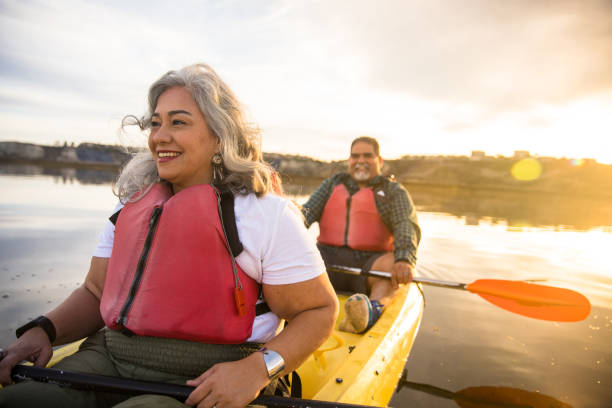The Benefits of Nature Therapy for Seniors
Nature therapy, specifically engaging in outdoor activities, can have numerous benefits for seniors. These activities contribute to improving mental well-being, reducing feelings of loneliness, and enhancing emotional health.
Improving Mental Well-being
Participating in outdoor activities within a natural environment has been shown to positively impact the mental well-being of seniors. According to a study published in ScienceDirect, nature therapy, including outdoor activities such as gardening, can reduce depression, lower stress levels, and improve overall mental health. Being surrounded by nature and engaging in activities like gardening allows seniors to connect with the natural world, which can promote a sense of calmness and tranquility. This connection has a positive impact on their mental well-being, leading to improved mood and a greater sense of happiness.
Reducing Feelings of Loneliness
Feelings of loneliness and social isolation can be prevalent among seniors. However, participating in outdoor activities can decrease these feelings and improve overall mental health. Engaging with nature and spending time outdoors provides opportunities for social interactions and connections with others who share similar interests. This social engagement helps combat loneliness and fosters a sense of belonging and community. Whether it’s joining a gardening club, taking nature walks with friends, or participating in outdoor group activities, the presence of companionship and shared experiences promotes a sense of connection and reduces feelings of isolation.
Enhancing Emotional Health
Engaging in outdoor activities, such as gardening, can provide seniors with a sense of purpose and accomplishment, contributing to their emotional well-being and overall satisfaction in life. The act of nurturing plants, witnessing their growth, and creating a beautiful outdoor space can bring a sense of fulfillment and joy. This sense of purpose can boost self-esteem, increase feelings of positivity, and enhance emotional health (ScienceDirect). Additionally, being in a natural environment and immersing oneself in the sights, sounds, and smells of nature can evoke a range of positive emotions, including relaxation, serenity, and happiness.
Incorporating nature therapy and outdoor activities into the lives of seniors can have profound positive effects on their mental well-being, combat feelings of loneliness, and enhance emotional health. By connecting with nature and engaging in meaningful outdoor experiences, seniors can experience improved overall well-being, leading to a higher quality of life.
Outdoor Activities for Senior Wellbeing
Engaging in outdoor activities is a wonderful way for seniors to connect with nature and improve their overall wellbeing. Here are three outdoor activities that can greatly benefit seniors:
Gardening and Yard Work
Gardening and yard work offer a multitude of benefits for seniors. According to ScienceDirect, nature therapy, including activities like gardening, can positively impact the wellbeing of seniors by reducing depression, lowering stress levels, and enhancing social connections.
For seniors, gardening provides a sense of accomplishment and purpose, contributing to their emotional well-being and satisfaction in life. It allows them to connect with the natural world, nurturing plants and watching them thrive. Gardening also provides an excellent opportunity for light physical activity, promoting mobility and strengthening muscles.
Nature Walks and Forest Bathing
Nature walks and forest bathing have gained significant recognition for their therapeutic benefits. According to Nature, forest bathing, which involves taking in the forest atmosphere, has been recognized as a preventative and curative approach for stress reduction, anxiety management, and mood improvement. It can significantly contribute to overall mental health and cognitive functioning.
Seniors who engage in outdoor activities like nature walks can experience decreased feelings of loneliness and improved mental health (ScienceDirect). These activities offer a chance to immerse oneself in the beauty of nature, providing a sense of tranquility and rejuvenation. They also promote physical activity and encourage seniors to maintain an active lifestyle.
Engaging in Meaningful Activities
Engaging in meaningful outdoor activities tailored to the interests and abilities of seniors can have a profound impact on their overall wellbeing. It could involve activities like bird-watching, nature photography, or even volunteering for environmental conservation projects. By participating in activities that align with their passions and values, seniors can experience a sense of purpose and fulfillment.
Engaging in meaningful activities in outdoor settings allows seniors to enjoy the benefits of nature therapy, such as reduced stress, improved mood, and enhanced overall wellbeing. It also provides opportunities for social interaction and connection with others who share similar interests, fostering a sense of community.
By incorporating gardening, nature walks, and engaging in meaningful activities into their routines, seniors can reap the numerous benefits of outdoor activities. These activities not only promote physical health and mobility but also contribute to mental and emotional wellbeing, allowing seniors to enjoy the beauty of nature while enhancing their overall quality of life.
Physical Health Benefits of Outdoor Activities
Engaging in outdoor activities as part of nature therapy provides numerous physical health benefits for seniors. These activities not only promote an active lifestyle but also contribute to overall well-being. Let’s explore some of the specific physical health benefits associated with outdoor activities.
Cardiovascular Health
Regular participation in outdoor activities can have a positive impact on cardiovascular health. Access to green spaces and outdoor environments promotes physical activity among seniors, leading to improved cardiovascular health and reduced risk of chronic diseases (ScienceDirect). Activities such as brisk walking, hiking, or biking can help strengthen the heart, improve circulation, and maintain healthy blood pressure levels. By incorporating these activities into their routine, seniors can enhance their cardiovascular fitness and overall well-being.
Bone Health and Vitamin D
Spending time outdoors exposes seniors to natural light, which plays a crucial role in bone health. Sunlight is a primary source of Vitamin D, essential for the absorption of calcium and the maintenance of strong bones. Engaging in outdoor activities increases exposure to sunlight, aiding in the synthesis of Vitamin D. This, in turn, promotes bone health and reduces the risk of conditions such as osteoporosis.
Improving Sleep Quality
Participating in outdoor nature activities can positively impact sleep quality for seniors. Exposure to natural light helps regulate sleep patterns, promoting better sleep and overall sleep quality (The Helper Bees). Adequate restful sleep is crucial for physical and mental well-being, and engaging in outdoor activities can contribute to a more restorative sleep experience. By spending time outdoors, seniors can establish healthier sleep routines and enjoy the benefits of improved sleep.
It is important to note that when participating in outdoor activities, seniors should take appropriate safety precautions, especially in cold weather conditions. Understanding cold weather safety measures and recognizing the signs of hypothermia can ensure a safe and enjoyable experience outdoors.
Incorporating outdoor activities into seniors’ lives not only provides physical benefits such as increased mobility and strengthened muscles but also offers mental health advantages like reducing feelings of depression and anxiety. Engaging in nature therapy can lead to improvements in both emotional and physical well-being, making it an excellent addition to senior care programs.
The Role of Nature-Based Interventions
Nature-based interventions play a significant role in promoting the well-being of seniors. These interventions encompass various outdoor activities that harness the power of nature to improve mental health, social connections, and overall psychological well-being. Let’s explore three key aspects of nature-based interventions: sensory stimulation and cognitive function, social interaction and connection, and psychological benefits of nature therapy.
Sensory Stimulation and Cognitive Function
Engaging with nature provides seniors with a wealth of sensory stimulation, which can have positive effects on cognitive function. According to studies, nature-based therapy has been shown to improve mental well-being and connectedness to nature, while decreasing depression scores. Being outdoors in nature can decrease depression and increase mental well-being (NCBI).
The sights, sounds, and smells of nature help stimulate the senses, promoting cognitive engagement and enhancing cognitive function. The abundance of natural stimuli in outdoor environments can improve attention, memory, and overall cognitive performance in seniors. Whether it’s the vibrant colors of flowers, the sound of birds chirping, or the scent of fresh air, these sensory experiences contribute to a more stimulating and enriching environment.
Social Interaction and Connection
Nature-based interventions also provide opportunities for seniors to engage in social interaction and foster meaningful connections. Participating in outdoor activities such as group nature walks or gardening allows individuals to bond with others who share similar interests. This social interaction can help combat feelings of loneliness and isolation, which are common among seniors.
Group activities in natural settings create a sense of community and belonging, providing a platform for seniors to connect with others, share experiences, and build relationships. These social connections contribute to improved mental well-being and a greater sense of support and belonging.
Psychological Benefits of Nature Therapy
Nature therapy offers a range of psychological benefits for seniors. Research has shown that nature-based interventions positively affect individuals with mental health disorders, improving self-esteem, reducing healthcare consumption, and increasing mental well-being and engagement. Connectedness to nature is associated with subjective perceptions of happiness, well-being, physical and mental health, and life satisfaction (NCBI).
Spending time in nature has a calming effect on the mind, reducing stress and anxiety. The serene and peaceful environment of natural settings promotes relaxation and emotional well-being. Nature therapy can also foster a sense of awe and wonder, providing a perspective that transcends everyday worries and concerns.
By immersing themselves in the beauty of nature, seniors can find solace, rejuvenation, and a sense of purpose. Nature-based interventions offer a holistic approach to improving the overall psychological well-being of seniors, allowing them to reap the benefits of the natural world around them.
Incorporating nature-based interventions into senior care programs can have a profound impact on the mental health and well-being of older adults. By recognizing the importance of sensory stimulation, social interaction, and the psychological benefits of nature therapy, we can create opportunities for seniors to thrive and experience the healing power of nature.
Safety Considerations for Outdoor Activities
When engaging in outdoor activities, it’s important to prioritize the safety and well-being of seniors, especially when it comes to cold weather conditions. Older adults are more susceptible to the effects of cold weather, and certain precautions should be taken to mitigate the risk of hypothermia and other cold-related health issues (NIH National Institute on Aging).
Cold Weather Safety for Seniors
Older adults are more likely to have certain chronic medical conditions that make it harder to stay warm, such as poor blood circulation, which increases the risk of frostbite due to exposure to temperatures below freezing. To ensure the safety of seniors during cold weather, the following precautions should be taken:
- Dress warmly: Layer clothing to trap body heat and protect against the cold. Wear a hat, gloves, and a scarf to cover exposed areas.
- Stay dry: Wet clothing can accelerate heat loss from the body. It’s important to stay dry and change into dry clothes if they become damp or wet.
- Avoid prolonged exposure: Limit time spent outdoors in extremely cold temperatures, especially when wind chill is a factor. Seek shelter and warmth when necessary.
- Stay hydrated: Dehydration can impair the body’s ability to regulate temperature. Drink plenty of fluids, even if you don’t feel thirsty.
- Use proper footwear: Wear insulated and waterproof footwear with good traction to prevent slips and falls on icy surfaces.
- Plan ahead: Check weather forecasts before heading outside and avoid outdoor activities during severe weather conditions. Consider rescheduling or finding indoor alternatives.
Hypothermia Prevention and Recognition
Hypothermia occurs when the body’s core temperature drops below 95°F, leading to serious health problems like arrhythmia, heart failure, and damage to the kidneys or liver. It’s crucial to be aware of the signs and symptoms of hypothermia and take immediate action if they are observed.
Early symptoms of hypothermia include shivering, confusion, slurred speech, and drowsiness. As the condition worsens, one may experience stiff and jerky movements, slow heartbeat or breathing, loss of consciousness, and even death. If someone is showing signs of hypothermia, it’s important to take the following steps:
- Call for help: Dial emergency services (911) immediately for professional medical assistance.
- Move to a warmer place: If possible, relocate the person to a warm and sheltered area away from the cold environment.
- Offer warm fluids: Provide a warm drink, such as a warm beverage or soup, to help raise the person’s body temperature.
- Wrap in warm blankets or clothing: Use dry blankets, towels, or coats to insulate the person and prevent further heat loss.
It’s important for caregivers and companions to be vigilant and proactive in recognizing the signs of hypothermia, particularly in cold weather conditions. Taking prompt action can significantly improve the chances of a positive outcome.
While outdoor activities are beneficial for senior well-being, it’s crucial to prioritize safety, especially in cold weather. By following these safety considerations and taking appropriate precautions, seniors can enjoy the benefits of nature therapy while minimizing the risks associated with cold temperatures.
Incorporating Nature Therapy into Senior Care
As the benefits of nature therapy for seniors become increasingly recognized, incorporating nature-based activities into senior care programs is gaining popularity. Nature therapy programs provide a range of advantages for seniors, promoting their mental health and well-being, enhancing social connections, and improving overall quality of life.
The Importance of Nature Therapy Programs
Nature therapy programs offer seniors the opportunity to engage in outdoor activities that provide numerous benefits for their physical and mental health. These programs prioritize the well-being of seniors by creating structured activities that cater to their specific needs and abilities. By incorporating nature therapy into senior care, it becomes possible to harness the positive effects of spending time in nature, improving the overall health and happiness of seniors.
Promoting Mental Health and Well-being
Engaging in outdoor activities as part of nature therapy has been shown to have a positive impact on mental health and well-being for seniors. Spending time in nature reduces stress, improves mood, and lowers feelings of depression and anxiety (The Helper Bees). Nature therapy provides a sense of calmness and tranquility, allowing seniors to escape from the pressures of daily life and find solace in the beauty of the natural world.
Enhancing Social Connections and Quality of Life
One of the significant advantages of nature therapy programs is the opportunity for seniors to connect with others and foster social connections. Participating in group nature walks, gardening activities, or other outdoor experiences creates a supportive and social environment where seniors can bond with like-minded individuals (The Helper Bees). These interactions reduce feelings of isolation and loneliness, improving overall mental well-being and enhancing the quality of life for seniors.
Nature therapy programs also provide a sense of purpose and meaning for seniors. Engaging in meaningful activities such as gardening or conservation efforts instills a sense of accomplishment and fulfillment. This sense of purpose contributes to a greater sense of well-being and overall satisfaction with life.
By incorporating nature therapy into senior care, organizations and caregivers can create tailored programs that harness the benefits of outdoor activities. These programs not only improve mental health and well-being but also enhance social connections, provide a sense of purpose, and ultimately improve the overall quality of life for seniors.



